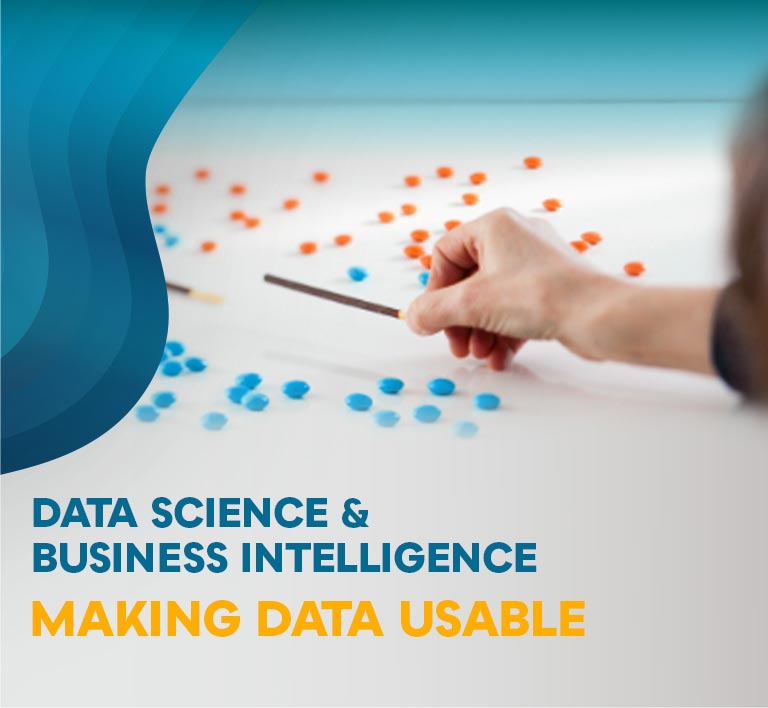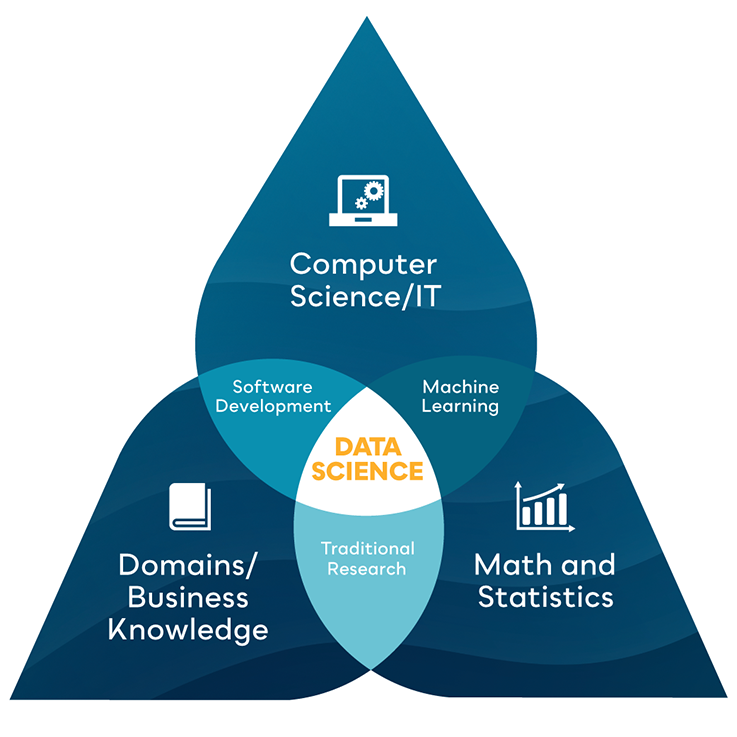

Data science & business intelligence
Machine learning and artificial intelligence – few topics are currently so widely covered in the media. This naturally boosts expectations immensely. HMS provides you with comprehensive support and keeps a clear perspective on the hype jungle.
If you want to systematically improve your business processes or open up new business models, you’ve come to the right place. We support you in using your data profitably. For maximum investment security, we use Proof of Concepts to identify and evaluate potential benefits. We also integrate the analytical models developed in this process into your business processes. Our agile approach allows us to concentrate on the core question at hand and to keep an eye out for opportunities and risks in close coordination with our customers.

Our services
- Individual consulting workshops for business intelligence and data science projects
- Explorative analyses and feasibility studies as well as Proof of Concepts for the evaluation of analytical value drivers
- Implementation, optimisation and interpretation of machine learning models and AI systems
- Support in the development of innovative data-based business models
- Design and implementation of system architectures for Business Intelligence and Data Science
- Consulting, training and coaching on analytical methods
- Standardised solution approaches through best practice examples, e.g. intelligent data integration using machine learning in the ETL process (IDI)
Methodology meets domain knowledge
In our data science solutions, we attach particular importance to combining the strengths of humans, algorithms and technology. Data science can only develop its full potential through the efficient integration of methodology and domain knowledge. This applies equally to feature design for model development or for the smooth integration of models and reports into existing business processes.
“Demand-oriented data analysis begins with understanding the customer process.” Kai Brodmann, Head of Data Science at HMS
Our toolbox
- Data Modelling, data integration and business intelligence
- Star Scheme, Snowflake Scheme
- Data Vault
- Classic DWH (ETL) and Big Data capable data-lake approaches (ELT)
- Dashboards, standard reporting, power user analyses
- In-depth methodical knowledge based on many years of project experience
- Supervised Learning
- Unsupervised Learning
- Visualisation
- Statistics
- Forecasting
- Broad methodical knowledge due to the heterogeneous training structure of our experts
- Simulations
- Heuristics and optimisation
Practical experience/knowledge
HMS improved the customer journey for insurance and telecommunications companies through effective method analysis during the online sale of products that require explanation. To compare individual channels, HMS examined the sustainability of different methods and the possibility of alternative models. The HMS experts used data provided by Google Analytics to compare the different touch points with regard to the conclusion of contracts.
Here, too, there was a duty to prepare the data before performing the analysis task. Missing values needed to be dealt with or outliers identified and evaluated. Based on a consistent database, data scientists analysed the influence of various parameters on a successful sale, such as “initial touchpoint”, “number of visits” or “days between first visit and successful application”. These findings in turn provide valuable indicators that help the marketing department to rethink the allocation of budgets to the individual channels and to optimise them according to parameters such as cost-per-contact.
The models used by HMS enabled a mail order company to significantly optimise its address selection. In the first place, the response rate was improved, which in turn reduced the cost per contact. At the same time, the strategic target of lowering the average age of respondents was significantly and noticeably improved. The alternative forecasting methods developed by HMS enabled more respondents to be identified than was possible with the previous methods.
For an online retailer, HMS analytically optimised the fit between product supply and customer demand. To achieve this, our data scientists merged customer data from a wide variety of sources. Alongside ERP data, we also examined socio-economic information and – crucially – personalised web traffic data. Based on the subsequent analysis file, which can contain more than 300 variables (data points) per customer, various machine learning algorithms were tested. The result was a forecasting model optimised for the respective customer structure.
In addition to significantly improved prediction quality, the concept designed and implemented by HMS primarily offers a high degree of sustainability. The procedures developed are self-learning, i.e. they adapt dynamically to changes in the data landscape and thus ensure consistent prediction quality. Moreover, a high degree of automation gives users in the company sufficient freedom to further develop customer relationships creatively – and most importantly profitably.
Project background: The question as to which product the customer will buy next and which contract he or she will conclude in the near future has always occupied the sales and marketing experts of all product or service providers. To create the right incentives to buy, more and more companies – both B2C and B2B – are relying on cross-selling and next-best-offer strategies. The aim is to optimise the use of advertising messages so as to present customers with the right offer for their current buying needs in good time. Frequently, however, these strategies are based on static sets of rules that do not take into account the customer data available within the company – or do so only rudimentarily.
With precisely tailored predictions, HMS supported a mechanical engineering company in optimising the production of customer-specific configured machines. Using analytical methods (forecasting), it was possible to reliably predict which individual parts would be required at what time and in which quantities. This had a positive effect on storage costs, production planning and service levels. In addition to the evaluation and integration of suitable models into the operational processes, our solutions included a user-friendly interactive visualisation of the parts requirement.
With reliable forecasts, HMS contributes to tangible process optimisation and cost reduction in warehousing and customer service in the manufacturing industry. The focus is always on ensuring smooth and efficient production.
We have designed CRM data warehouses for all types of industries and sizes of companies. Our extensive expertise in data management comes into its own when integrating web data from online commerce or online platforms. For example, the data warehouses we set up for online retailers are governed by high-quality data and efficient data flows. This data enables targeted analyses that help to optimise business processes in a wide range of specialist departments.
ERP systems, web data, response information – the greater the detail with which the customer behaviour of website visitors can be described in online trading, the more precisely their wishes can be met. The calculation of cross-selling potentials or “next best offers” requires careful preliminary work. Data flows need to be modelled, characteristics have to be efficiently merged and data quality aspects must be taken into account. This is what we have been doing since 1989.
The experts at HMS succeeded in significantly improving the prediction quality of an energy supplier’s existing forecasting models. For this purpose, we obtained the load curves of business customers in previous years, enriched this data with additional information – for example regional holidays – and used it to forecast demand for the following year. The really smart thing about this was that the energy supplier kept the data for the forecast period to themselves, so they were able to compare our forecast values very well with the method used to date. The result was that even with the help of the limited additional data available to us, we were able to make profitable use of our analytical expertise and, in some cases, significantly improve existing methods.
Project background: Predicting energy demand is a complex and at the same time vital process for the energy industry. Regardless of whether too much or too little energy has been purchased, any deviation from actual demand will lead to unnecessary costs. Energy suppliers therefore forecast the long-term energy requirements of their customers. This is done partly using Excel and partly using forecasting models that are integrated into the industry’s software solutions. This is why improving forecasting quality is a valuable competitive advantage in a fiercely contested market.
Data experts since 1989
We have extensive expertise in business intelligence and data science. We skillfully combine over 30 years of expertise with your unique domain knowledge – only then will your data unfold its full potential.
Practice-oriented solutions
We believe in partnership and cooperation without technical and methodical dogma. Driven by a solution-oriented pragmatism, we always have the commercial benefit of our customers in our sights and don’t get lost in theoretical shallows.
Knowledge sharing
The transfer of knowledge to our customers plays an important role in our work. The more you know about the application possibilities of data analysis, the more you can profit from us in a needs-based and target-oriented way.
